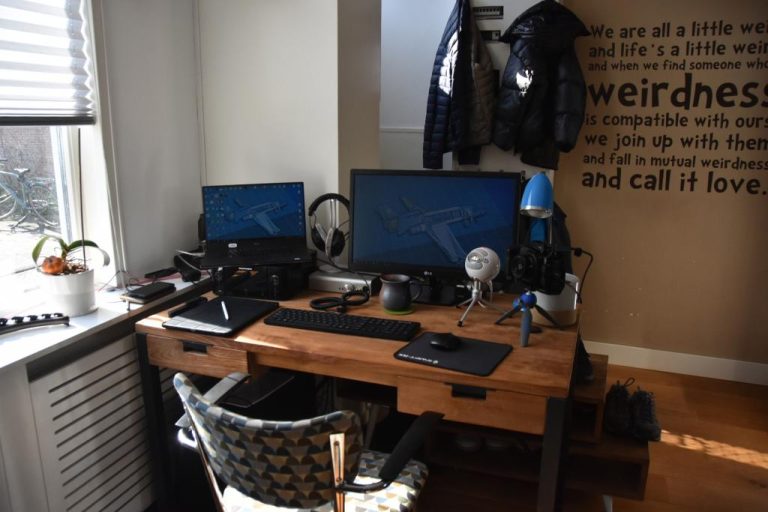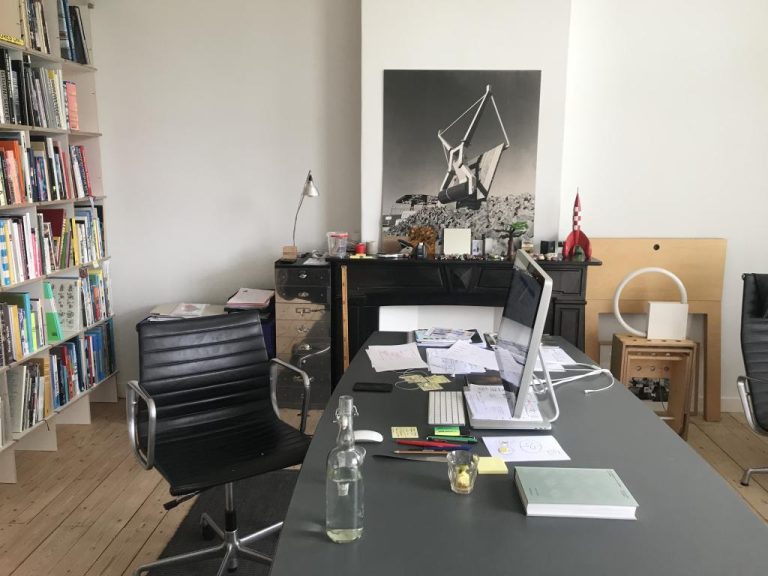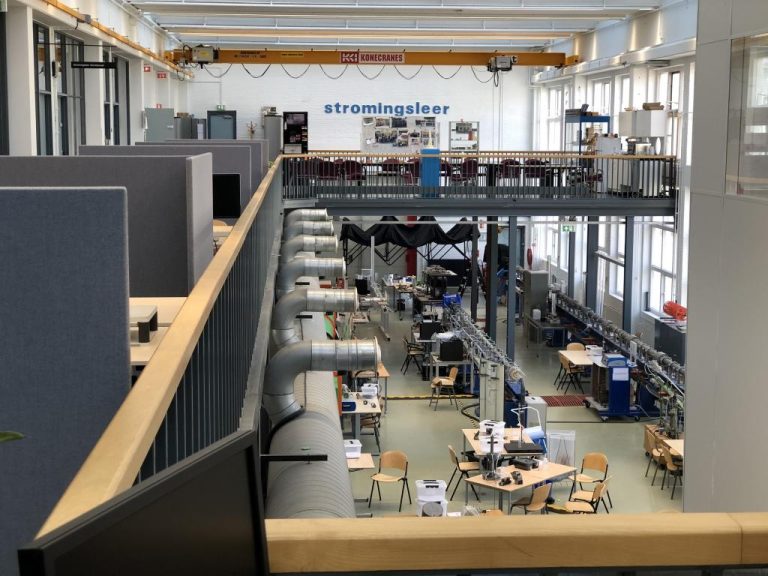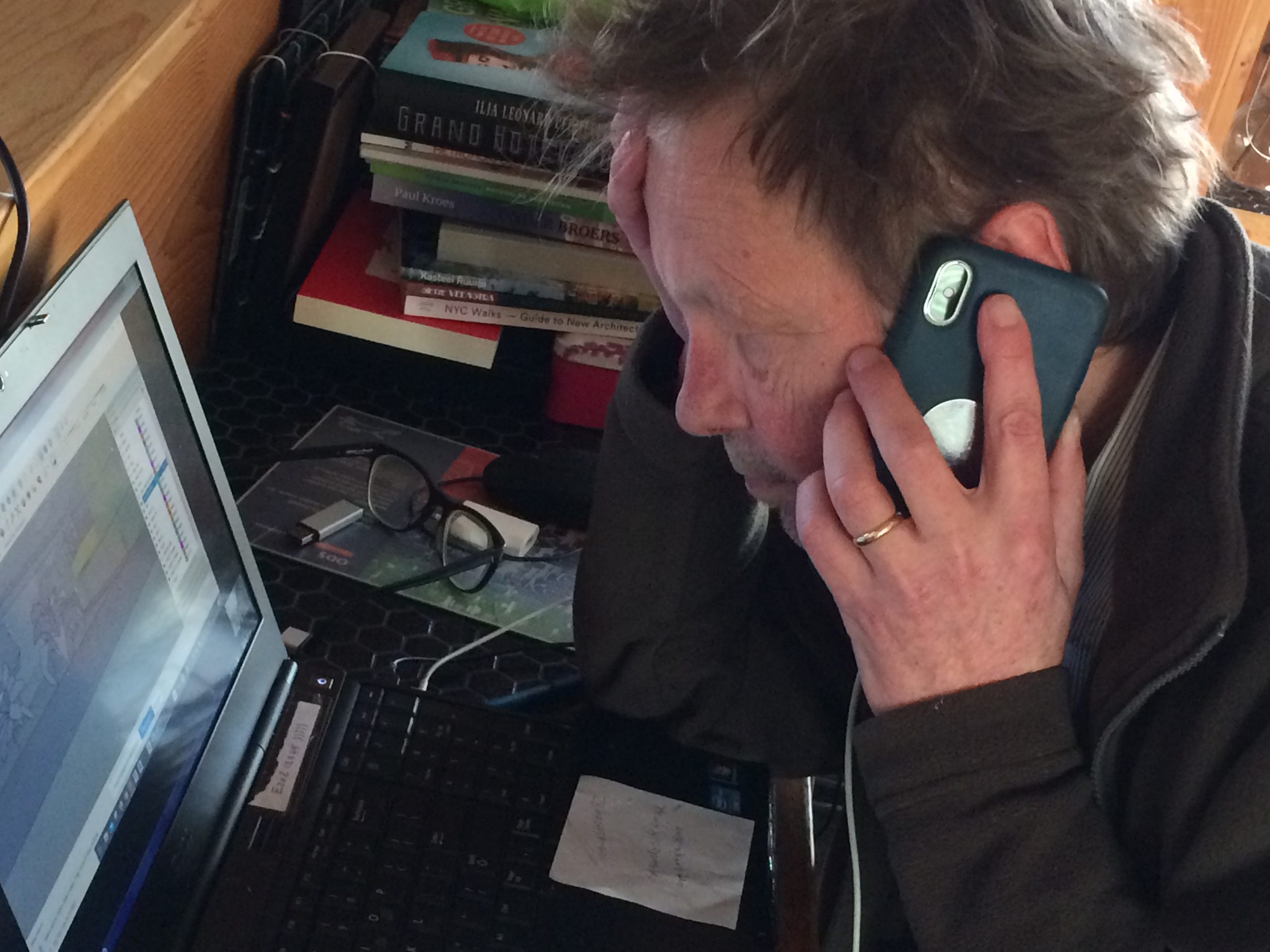The majority of TU staff have been working from home for about two weeks now. How are they doing? Delta asked four teachers. “We’re kind of working shifts.”
Engbert van der Zaag: “I never used all that digital technology before.”
Engbert van der Zaag, Building Technology teacher at Architecture and the Built Environment, lives with his retired wife in Amsterdam.
“I don’t have children at home and can work in peace, but I’ve never used all that digital technology before. I have to get used to it and it’s very intensive. I usually give my lessons on a drawing paper roll with drawing pens. I’m not yet sure how to do this online. A drawing says more than words. Trying to describe a building in words takes a whole book of words. Drawings make it clear immediately.”
‘My time is much more flexible’
“I teach small groups and supervise graduates one day a week. I don’t give lectures to large groups. Luckily I don’t have to go into that technology in depth. I see that a certain dynamism is missing on this medium that is there with face to face lessons where students are more prepared to help each other and are more attentive. That’s a real shame.”
“I live in Amsterdam. I’d sometimes have to travel for four hours for a meeting with one student in Delft. I can now do this easily with Zoom. My time is much more flexible. I am available for discussions with students and colleagues all week and that is really good.”


Calvin Rans, Associate Professor Aerospace Engineering and Teacher of the Year 2019, lives in a small house in Delft with his wife and two children (15 and 17).
“It’s hard to work at home. My house is full of people. We only have three desks so it’s like playing musical chairs. I take a lot of breaks and we have a kind of rota system. I mostly work in the evenings when the others have stopped working. I go to bed later and get up later.”
‘Being able to reflect is one benefit of this crisis’
“I teach the Forensic Engineering module that involves an exam in which an airplane wreckage is examined. As we can’t do this now, we are working on a digital research project in which we show videos and let journalists and the police talk. So the students can still follow the module, even if in a different way.”
“This situation is making me think about my subject and what I want to achieve with it. I sometimes don’t have the time to reflect much, but now I have to as there are so many things we can’t do. I ask myself what is the essence of my subject? What do I want to bring across? Being able to reflect on this is one benefit of this crisis.”
“My diary was suddenly empty. A lot of things were cancelled, such as the elections for the Teacher of the Year. I am now helping with setting up online tools and recording lectures. One positive thing is that I am closer to my colleagues now as we ask if anyone needs help sooner. And I’ve spoken to my family and friends much more over the last few weeks than before the corona crisis.”


Thijs Asselbergs, Professor of Architectural Engineering at Architecture and the Built Environment lives with his wife and children (both in their 20s) in Haarlem.
“I have two children at university, one in London and one in Amsterdam. They are both at home now. Luckily we have enough space. I have my own study and working at home is going quite well. We eat together. Sometimes I go for a walk in the park. I don’t envy the people who live alone.”
“I usually work half time for TU Delft and half time for my own architect firm. So I was used to working at home. Even more so, I prefer working at home to working at the open work spaces at the Faculty.” He laughs, “One big difference is that everyone has become one dimensional!”
‘My work pressure has increased’
“Things have changed. I now give lectures on Zoom. I can share the presentations there, and the discussions go well. I can walk through the lecture hall virtually and give the students their turn. It is more intense though, so I have to concentrate. My time is organised by the hour so I can’t let anything run out. Previously I would just drop by someone and now I have to make a telephone appointment. Work has become hugely organised.”
“My work pressure has increased. My work is more intense and more structured now. I am also learning a lot of new things and don’t have to spend my time in traffic jams any more. I now have the skills to do more online, such as having discussions with students. I do wonder though, how we will do the graduation presentations. It should still be a celebration. Maybe I can throw them their degree certificate, maybe along with a bunch of flowers?”


Daniel Tams’ empty fluid mechanics lab.
Daniel Tam, Assistant Professor Fluid Mechanics (3mE), lives with his wife and three children (5, 9 and 12).
Daniel Tam currently spends half his time at home. The other half he works at TU Delft. “I have a lot of simulations with bio fluids and micro algae that simply have to continue. I can’t do them at home.”
“I find it really hard to work at home. I have suddenly become the teacher of three different age groups and I have to do my own work. We plan the day with the children every morning. At 08:00 we do the preparation and explanation and at 09:00 everyone goes to their room to do their homework and then I have an hour for my own work. But the children still come to ask questions. After a short break, we work for another hour. We then have lunch and the children go outside. I can’t do all my work at home, only answer emails and give feedback.” He laughs, “I use the mute button a lot during online meetings.”
‘It’s going to be a lot of juggling with the exams’
“It’s going to be a lot of juggling with the upcoming exams. How can you avoid students from sharing answers on WhatsApp if you’re doing the exam online? A verbal exam on Skype may work, but doing an exam individually with 80 students is a huge amount of work. Students also don’t always want to do this. I can’t ask them as many questions and I may then ask them about just that part that they haven’t practiced thoroughly.”
“In the back of my mind, I remember that these are exceptional times and that I may make exceptions. We usually let our son game for four hours a week. Now, if he reads for one hour he can have one hour extra to game. And if you yourself want to watch TV all day long for once, just do it. And if something doesn’t work out for once, that’s ok.”
Do you have a question or comment about this article?
s.m.bonger@tudelft.nl


Comments are closed.